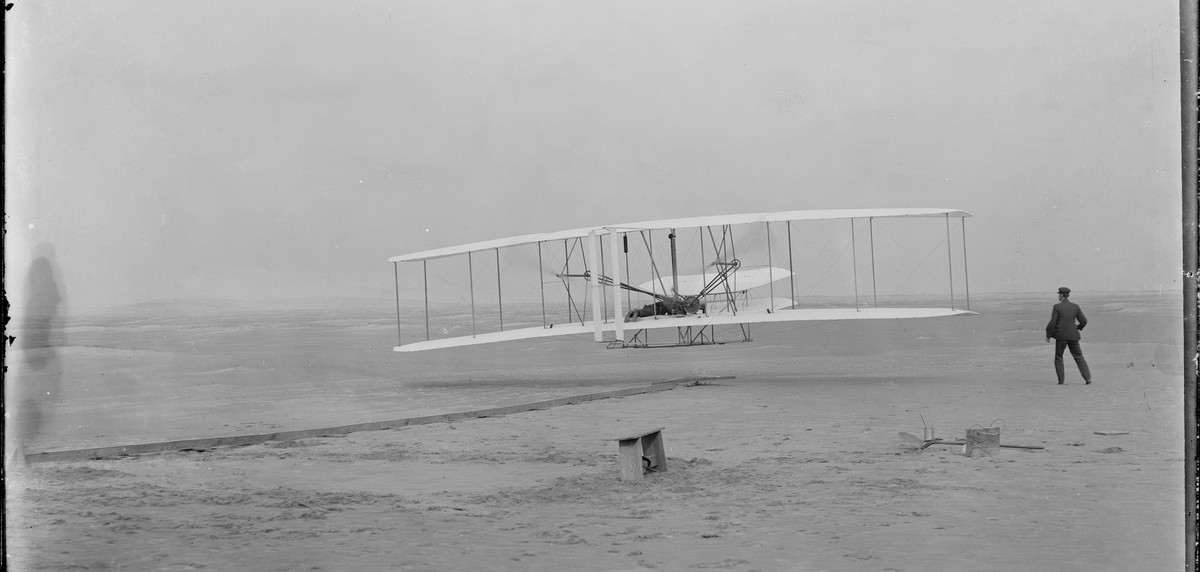How do we search for discovery?
 Library of Congress
Library of CongressImagined for centuries, with unimaginable consequences and only examples from nature effortlessly demonstrating what is possible. The invention of flight bears numerous similarities with our on-going search for the discovery of human-level artificial intelligence (AI). Even today, as some of the most brilliant and successful people of our time recede into a type of paranoid fever dream about its dangers, others continue to argue true AI is simply impossible. We have been here before, and come out the other side of a search for discovery. What lessons from the invention of flight can we bring to our research on AI today?
I can state flatly that heavier than air flying machines are impossible. — Lord Kelvin, 1895
Before jumping in, a brief aside, the Wright brothers process for invention is something we can all learn from, but they were still (like everyone) far from perfect.
My thinking about this was inspired by a paper recommended to me by Marc Bellemare, “The Airplane and the Logic of Invention” (Bradshaw 1992). Bradshaw's principle insight comes from asking “Why Did the Wright Brothers Invent the Airplane?", and exploring the notions of design-space versus function-space (re)search.
While reading this paper, the similarities with our field's approach to AI research were overwhelming, and it felt essential to discuss them more broadly. I'll quote briefly from Bradshaw's paper to set the context, but I would encourage you to read it yourself as it is fairly short and has many more interesting observations than what I am focusing on here.
Design-space
As epitomized by the numerous failed attempts from large groups with deep pockets, design-space search focuses on complete solutions and making measurable progress on the final task (flying). Other groups working on flight had brilliant minds and armies of workers to realize their goal. Perhaps because of their size and resources they tended to take a particular approach to their research.
Developing an airplane meant exploring the set of possible designs: single-wing and tandem-wing designs, pusher or tractor propellers, and so on. […] These investigations focused on two global measurements: time and distance in flight. Time and distance in flight are functions of many factors. […] Two different designs can achieve roughly comparable performance for quite different reasons.
Function-space
By comparison, the Wright brothers approach was starkly different. Working out of a bicycle shop, with the help of only a handful of employees, they took to studying flight piece by piece. Famously, their early experiments involved flying kites at Kitty Hawk to test their early designs for aircraft.
Their major concern was how to achieve certain functions in an airplane: lateral control, sufficient lift, etc. The brothers would isolate the problem and search for a solution. […] They created new instruments and techniques to study the problem. […] The natural independence of aerodynamic factors […] Lift could be addressed without regard for lateral control, and vice versa. Without this independence search in function space would be difficult.
Do you see any similarities to how people approached flight over one hundred years ago and how we are approaching AI today? I do, and I'm afraid we all look more like the unsuccessful groups than we look like the Wright brothers. Recent progress in AI has come with a wave of design-space research. Design-space research aims for `end-to-end’ learning and focuses on measuring state-of-the-art performance in benchmarks and leaderboards.
This isn't bad per se, if we already have the fundamental principles for AI (as for flight after the early 1900's) then design-space research is extremely effective at optimizing on those principles. But, it is not effective at searching for discovery.
What are the independent factors for intelligence?
I don't know, but until someone figures it out we will have a hard time making the significant discoveries that move us towards human-level AI.
My guess is that AI, or intelligence in general, is not about doing something exceptionally well. Intelligence is about that momentary gap between when you first find something you need to do and when you are able to do it well enough. What is going on in that gap? I think most of what we really need to work on around intelligence all happens there, and then it happens over and over again for the rest of your life.
I would argue that most of the ways we measure AI today look a lot like improving airplane design by measuring distance flown, and downplay the crucially important details of what is happening to get you up in the air. A rock can “fly” a long distance if you throw it hard enough; if I practice and become amazing at throwing rocks, am I making progress on flight?
How much of our progress in AI looks like throwing the rock harder and harder, further and further? How can we find out what these independent factors of intelligence really are?
Also, it would be a huge plus if we can measure them while flying kites on the beach.
